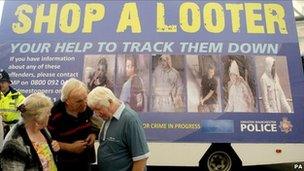Faster work by Met 'might have spared Manchester riots'
- Published
The August riots probably would not have spread to Manchester if police in London had acted faster, the city's chief constable has told BBC Panorama.
Peter Fahy said, with the benefit of hindsight "if London had been under control sooner, we probably would not have faced the problems in Manchester".
He added that his force is still tracking down hundreds of suspects from at least 300 crime scenes.
When the riots hit London, Manchester sent 100 public order officers to help.
Chief Constable Fahy said that after three nights of watching coverage of rioters on the streets of London, the violence and looting spread to his jurisdiction.
"We think it happened here because a certain group of people saw what was happening in London and decided that they seemed to be getting away with it."
Mr Fahy said that while his own force was short the 100 officers sent to London, he had no regrets about the decision.
"We knew what was absolutely critical was that there needed to be control of London. Because that was just creating more and more copycat violence up here."
He added that on both the streets of Salford, and then in Manchester city centre, his officers were taken by surprise by the level of organisation among the criminal element.
'Not enough'
A preliminary report by the Metropolitan Police into its own response to the rioting found that too few officers were deployed onto the streets of London during the first three nights of rioting between 6-8 August.
About 3,000 officers were deployed across London on the first night - Saturday - plus 380 public-order officers in Tottenham and the rest of Haringey borough.
By Sunday that had risen to nearly 4,300, while about 6,000 were on the streets on Monday.
"It soon became clear that even the increase to 6,000 officers was not enough and, as such, the number was increased to 16,000 for Tuesday night," the report stated.
The minister responsible for policing and criminal justice, Nick Herbert, said there was a public perception that police at times appeared to be standing back, but were in fact ensuring that it was safe to intervene rather than risk further injury or damage.
"I think it is common ground that we want the police and they themselves want to be able to deal with these situations very swiftly and to ensure that there is a rapid response if anything like this happens again."

Police said their aggressive approach has helped catch looters
Mr Herbert added that planned budget cutbacks will not be a factor in Greater Manchester Police's ability to tackle future unrest.
"There are still going to be something like 6,500 officers in Manchester," he said of the policing levels once the service has dealt with a planned £50m budget cut.
In the first eight weeks after the rioting, Manchester police made 232 arrests and by 1 November, more than 350 people had been arrested.
About half the adult offenders so far convicted come from the most impoverished neighbourhoods in Greater Manchester and more than a third of those brought before the court were under 17.
Of all those charged in relation to the Manchester riots more than 80% already had criminal records.
Panorama: Inside the Riots, BBC One, Monday, 14 November at 20:30 GMT and then available in the UK on the BBC iPlayer..
- Published1 November 2011
- Published24 October 2011
- Published15 September 2011
- Published13 August 2011